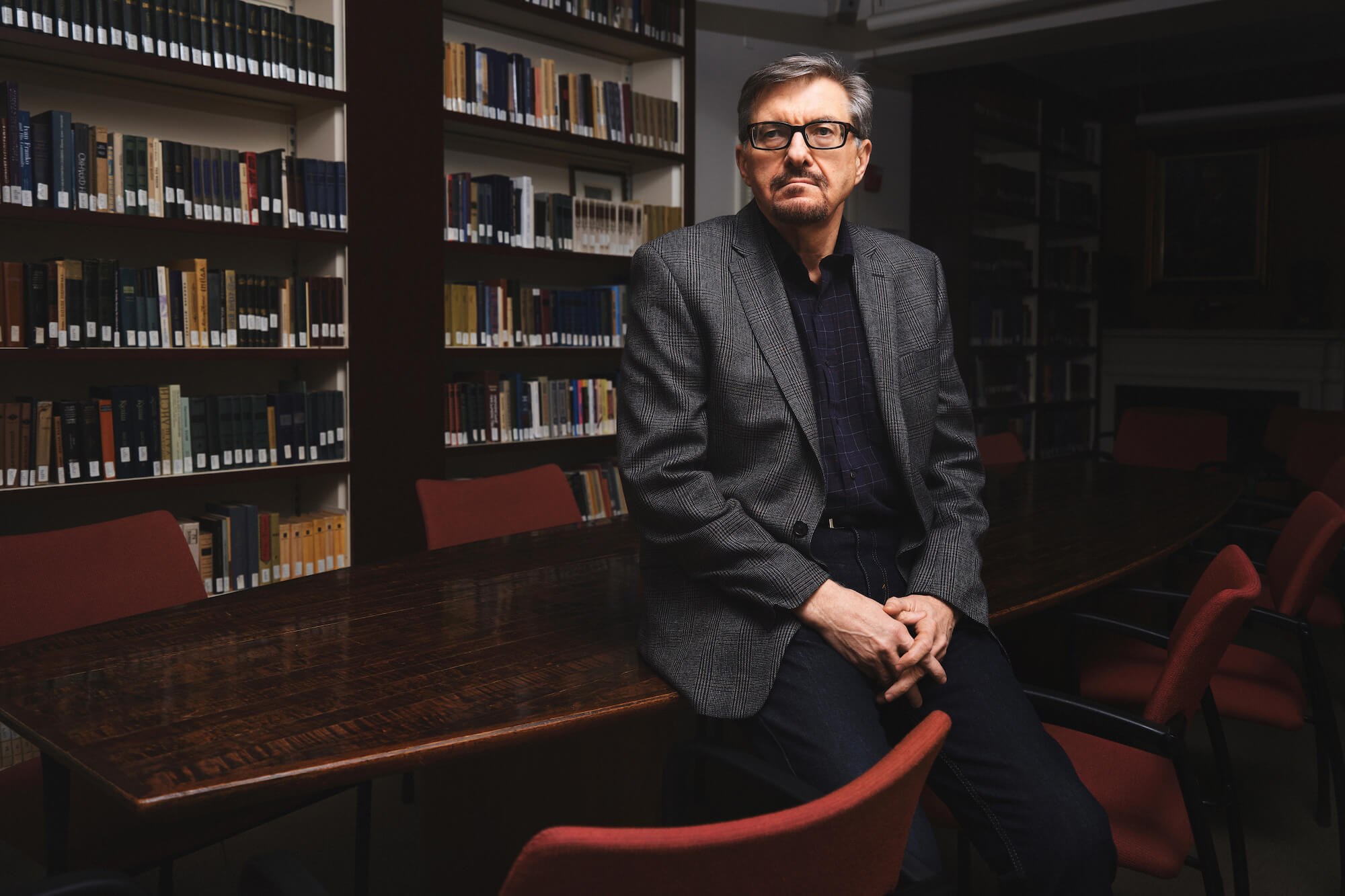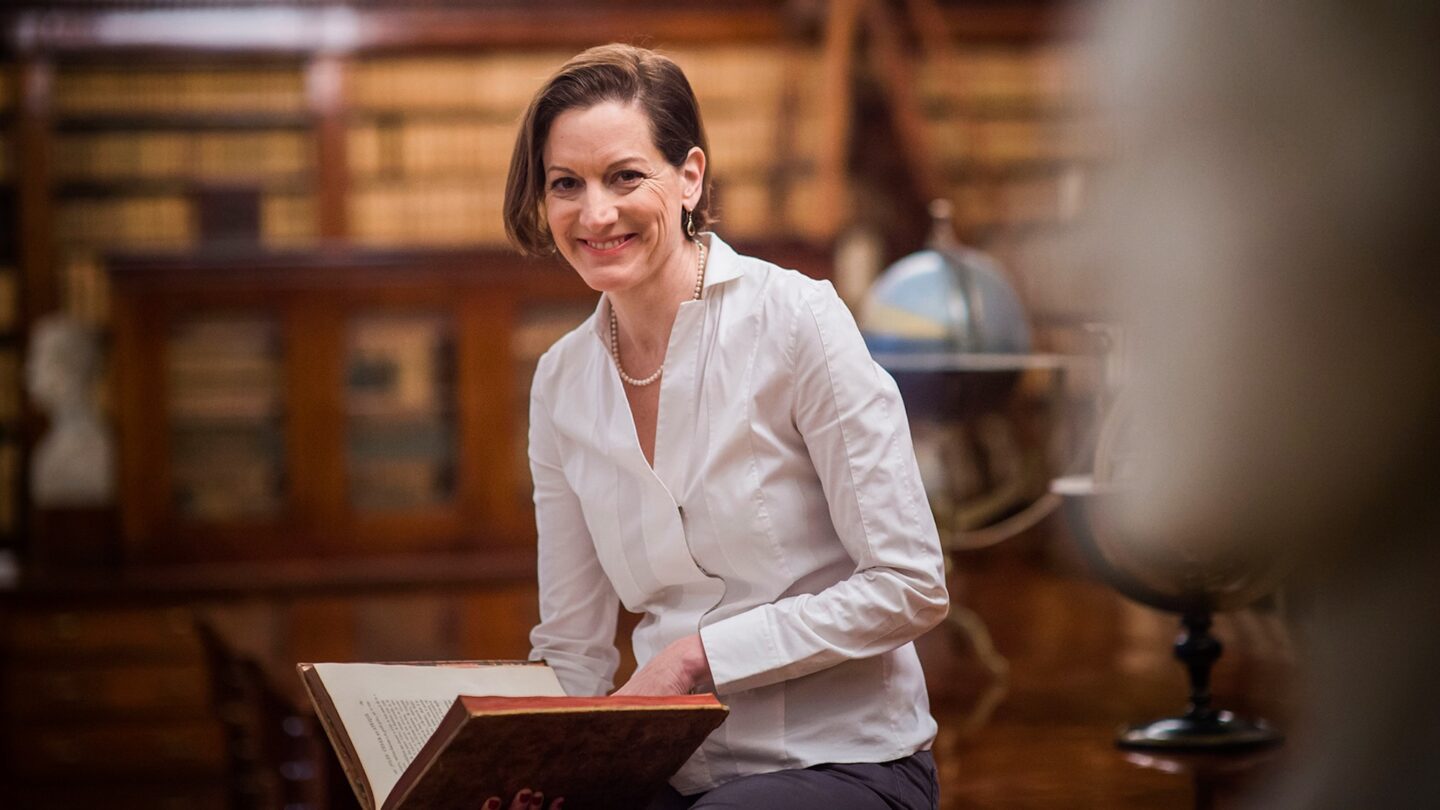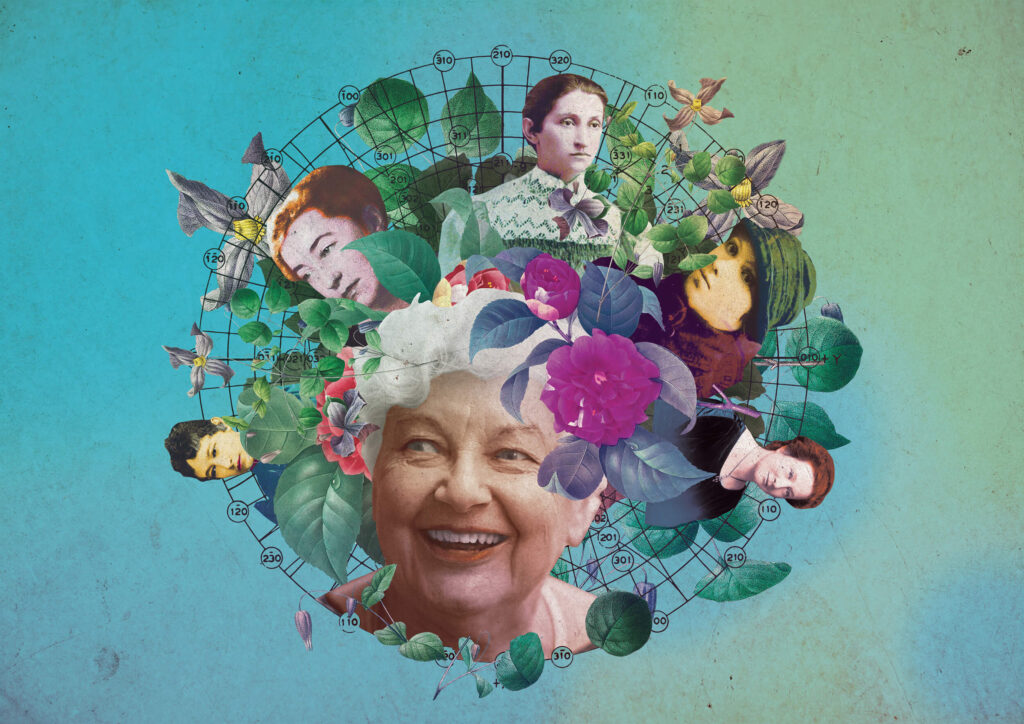“Sometimes people ask me: “Is Mykhailo Hrushevskyi still alive? Maybe he has some money left for additional research support?” says Serhii Plokhii with a hint of a smile, showing one of these e-mails with a request to introduce him to Hrushevskyi. Serhii Plokhii is the Mykhailo S. Hrushevskyi Professor of Ukrainian History and director of the Ukrainian Research Institute at Harvard University.
“It’s hard to translate this into Ukrainian because it’s not a department chair as we understand it in Ukraine. It is a named position. It usually honors the name of the donor. The donated money is invested—and the interest covers the professor’s salary. Since the fundraising campaign was organized by the whole Ukrainian community—which was quite modest with only a few rich members—Professor Omeljan Pritsak, the founder of the Harvard Ukrainian Research Institute, decided that these positions should be named in honor of prominent Ukrainian researchers. So there is the Oleksandr Potebnia Chair of Ukrainian Philology, the Dmytro Chyzhevsky Chair of Ukrainian Literature, and the Mykhailo Hrushevskyi Chair of Ukrainian History.”
The Ukrainian Research Institute at Harvard University is a two-story building at 34 Kirkland St. in Cambridge, Massachusetts. It was built in 1840 and is now owned by Harvard. The Ukrainian flag is the first thing you recognize it by. However, Ukrainian flags are not uncommon in Cambridge or on the Harvard campus. They are often seen on private homes, and when the full-scale invasion began, the Harvard administration also hung the Ukrainian flag on its building to demonstrate its solidarity and support for Ukraine in its fight against Russian aggression.
“Our flag is one of the few that has always been there,” Plokhii says. “We are very proud of it. It is our attribute, an attribute of our identity. Ukrainian flags are what people hang and recognize today because they know what it is about. The credit, of course, goes to Ukraine, Ukrainians, and the Armed Forces of Ukraine. Without this resistance, which the whole world has been watching in amazement, this would not have been possible.”
Serhii Plokhii has not only a Ukrainian flag, but also a reproduction of Malevich’s painting in his office. As a director and professor, he usually starts his day around seven in the morning, and his workdays are scheduled to the hour. But he does not complain. He has a few meetings after our interview, just as he had a few before.
“My position is very privileged. I have the opportunity to ask questions and answer them myself. I know I have had it at many stages of my career. Most people do not have that opportunity. I appreciate that freedom of choice and creative freedom.”
§§§
The Ukrainians Media is an award-winning independent media company focusing on high-quality, long-form, and visual journalism. Our mission is to foster positive social changes in Ukraine.
This story was created thanks to the support of our readers. Please join The Ukrainians Community on Patreon and help us publish more important and interesting stories.
§§§
He spends his days in Harvard’s wonderful library
Nearly forty years ago, Frank Sysyn, an established American and Canadian historian and then deputy director of the Ukrainian Research Institute at Harvard, received a letter from a researcher in Dnipropetrovsk who wanted to study the period of the Union of Brest.
“This was unprecedented at that time. No one [from Ukraine] worked at our institute, maybe one researcher at most.”
At that time, the institute—according to the will of the Soviet government—was largely isolated from Ukraine. Researchers often wrote their papers without access to Ukrainian archives and sources.
“The Soviet government followed a certain research policy and selected who was wanted and who was not. So you can imagine the situation we were in when I received a letter from Professor Plokhii telling me that the Soviets had approved his candidacy as an exchange scholar and that he was coming to Columbia in New York, but also wanted to visit us at Harvard. I thought nobody knew who was working for whom in the Soviet Union and what they wanted, but a researcher was coming, and we had to collaborate with him on his research.”
In the 1970s, Frank Sysyn helped establish Ukrainian studies at Harvard. An expert on Ukrainian history, he explains the role of Ukrainian studies in Northern America. He says that research at American and Canadian universities would have been impossible without the efforts and support of the Ukrainian diaspora.
“We called it a community miracle,” he says. “The fact that we were able to establish an institute at Harvard, we owe it to 15 thousand people of Ukrainian origin who donated money for the foundation. It was a huge fundraising campaign. It was necessary to visit communities regularly and talk to people. The same in Canada. The Canadian Institute of Ukrainian Studies exists in large part thanks to Canada’s policy of multiculturalism, in which Ukrainians have played a huge role.”
Among other things, Frank Sysyn organized some of the earliest research on the Holodomor—even though the Soviets had not recommended work on the subject.
“Our contacts deteriorated. The Institute was researching the Holodomor, then called the Great Famine. The delegates of the Ukrainian Soviet Republic warned us. During their visits, they said that some of us might have gotten posts in the Soviet government if they had stopped research on these issues. Fortunately, our professors and directors refused, and we carried out the project.” [1]
It was worrisome that the researcher from the Soviet Union should arrive just before USSR was supposed to celebrate the millennial anniversary of the conversion of Rus to Christianity.
“We thought the Soviets wanted to have an ‘in’ at our institute. I’ll tell you quite honestly what it looked like on our side. The Soviets organized a large-scale international campaign to draw attention to Moscow, to the Moscow Patriarchate. At the same time, we carried out a much-discussed project in our community and another, international, on the millennium of Ukraine-Rus Christianity. In a sense, it was a competition with the Soviet side and the dominant opinion of Western researchers.”
His first impression of the historian from USSR: He knows the sources and languages, works hard in the library, and comes from a reputable school for primary source specialists in Dnipropetrovsk, founded by Professor Mykola Kovalsky.
“We knew that the specialists of this school wrote amazingly interesting works. The fact that Plokhii spent his days in Harvard’s wonderful library convinced me that he was not a KGB agent who came to scout our work but a real scholar.”
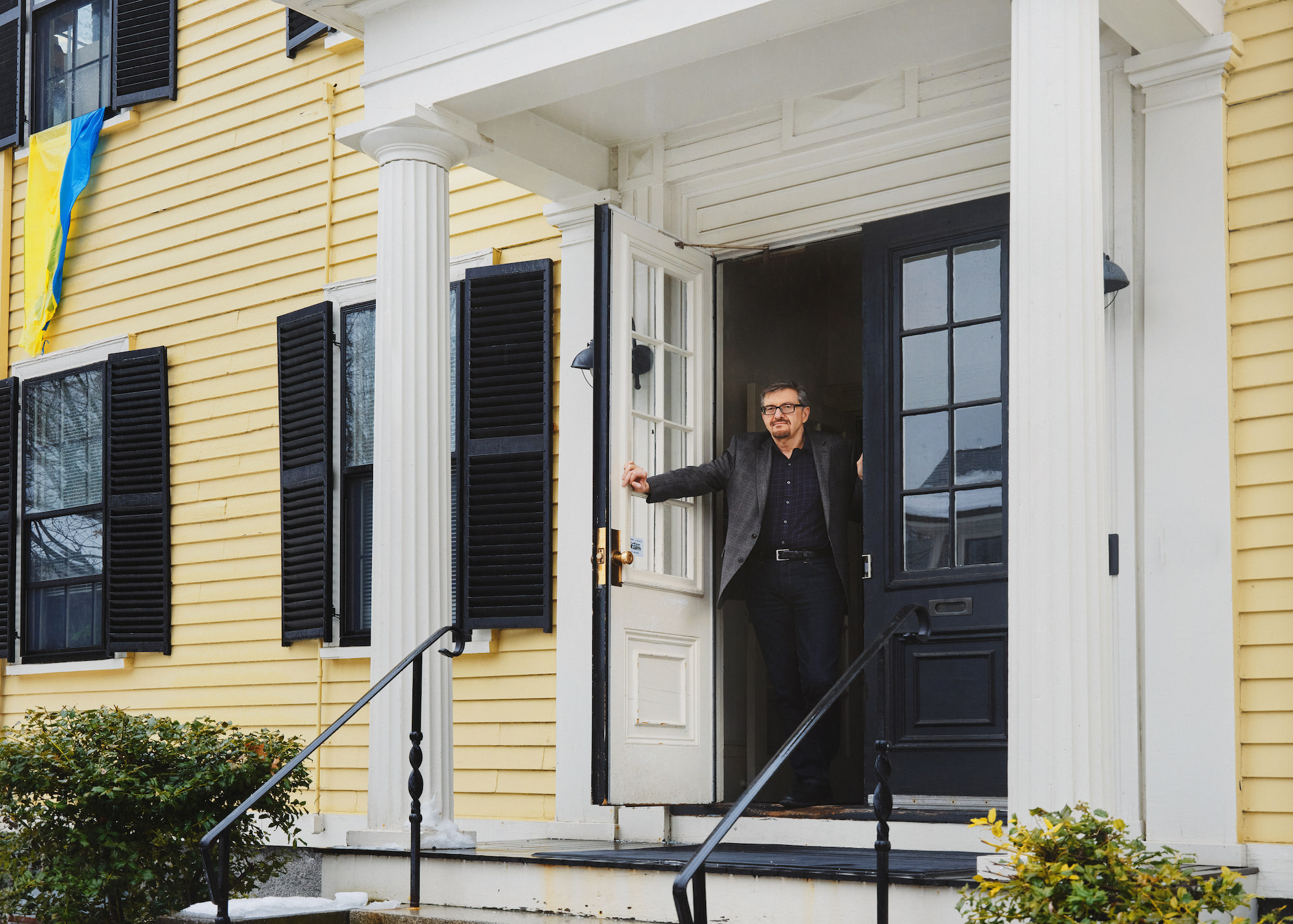
Frank Sysyn recalls: “Serhii Plokhii worked at Harvard until Easter. Then he returned to Columbia, where his wife Olena joined him.” Then Sysyn’s family decided to invite the Plokhii over. Sysyn’s grandparents had emigrated from the Boiko region—a region in the Ukrainian Carpathians—to the United States after World War I. His parents were born in America.
“Obviously, there was some prejudice: ‘We are going to invite these Soviet people, but who are they?'” says Frank Sysyn. “But things went well. There were a lot of Ukrainians living in our neighborhood. We took them to meet our neighbors. It was exciting. Our people asked them many questions about what was going on, about many things. It was a hard time for someone from the Soviet Union.”
A lucky coincidence
Serhii Plokhii learned about the meaning of censorship in his first year of study at the department of history at Dnipropetrovsk University. He remembers: “You come, and the first lecture is titled: ‘We are all fighters of the ideological front. ‘ The first rumors in the dormitory are about some students expelled from the university a year or two earlier for their jokes about Chapayev. Why? How was that possible? You find yourself in an environment where you realize it’s a system with overarching political control.”
Serhii Plokhii was born into a first-generation family of the intelligentsia: his father was an engineer, his mother a doctor. He grew up in Zaporizhzhia. He attended a specialized school with advanced English classes. He dreamed of studying journalism but enrolled in the history department. Decades later, his daughter would realize his boyhood dream in the United States.
“My father insisted, ‘What if you have no talent and become a bad writer? Then what are you going to do with your journalism degree? You’d better get another job,'” Plokhii says. “Once, my father said he was thinking of becoming a historian, and I was also interested in history. So I decided to major in history and later study journalism. But history draws you in. In a way, it was a coincidence, but it turned out to be a lucky one for me.”
The young man applied to the Zaporizhzhia Pedagogical Institute but got a С in English. The formal reason was the wrong use of articles. However, Serhii Plokhii says that there was a certain policy of discrimination against the ‘wrong’ background—secretly, but clearly.
“Of course, they cut me,” he says. “I was a socially wrong element. I came from a family of the intelligentsia. They preferred members of the Communist Party, people with work record, people who worked in collective farms or at least had a certain social background: not ‘white collars,’ but people from the working class or elsewhere.”
A year later, the son of an engineer applied to the university for the second time—not to the one in his hometown of Zaporizhzhia, but in Dnipropetrovsk. He remembers meeting one of his relatives who remarked, “Oh, so you want a career.” The budding historian did not understand what he meant.
“There were many people, especially young men, who had just returned from the army. Many of them were career-oriented. From that point of view, the people who had enrolled in history out of pure fascination were a minority. It was a strange combination: those who were really fascinated by history and those who were interested in history but even more interested in a political career in the Soviet context. There was everything at once, and we were all together.”
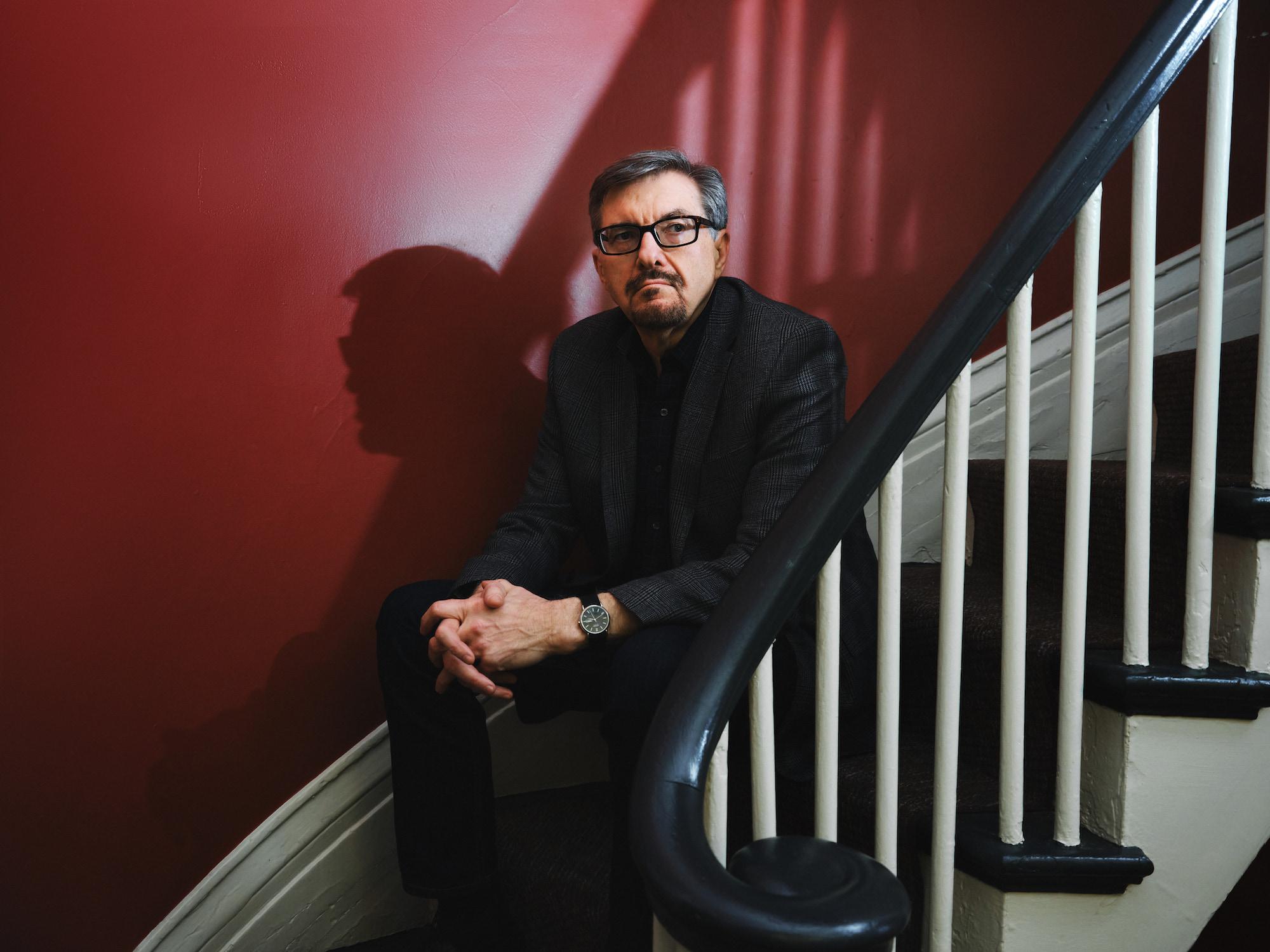
One of the fondest memories of his university days was his first archeology internship. In the south of Ukraine. Above all, student Serhii Plokhii wanted to be in the same group as his fellow history student, Olena—his future wife.
“We were four guys and maybe ten or twelve girls,” he says. “We were excavating Scythian burial mounds. At first, we had no idea what it was, but then it turned out to be the grave of a horse that had been looted. It was littered with boulders, and we boys spent the whole three weeks hauling them. The girls did not have much work: they just cleaned up with spades or brushes. The boys hauled the boulders all day long, and the girls sat around the pit and sang songs. My fascination with the Scythians had faded.”
However, Serhii Plokhii found something more important there, or, rather someone—his future wife and mother of his two children, and also the first reader of most of his books. Now he says with gratitude: “I believe that the things I’ve been doing would be impossible without her understanding and support.”
Everyone gathered at the Plokhii’s house
Albert Wenger—chair of the world history department of Oles Honchar Dnipro National University—says that Serhii Plokhii chaired the department for almost a decade, from 1983 to 1992. Albert has not crossed paths with the professor but has many things in common. His history teacher, Liudmyla Perederiy, originally from Kryvyi Rih, was a fellow student of Plokhii. Wenger also published an essay with memories of Plokhii’s students.
He says, “Plokhii did not live in a dormitory. By the way, it’s also about one of his most important qualities—decency. Why didn’t he live in a dormitory? Because those who reported the real income of their parents did not live in dormitories. He wrote a real number—and did not get a place. He would have gotten it if he had done what many others did—cheated and downplayed the number.”
As a student, Serhii Plokhii rented an apartment. He visited the dormitory, like everyone else, for birthday parties and celebrations. He also went with fellow students to pick tomatoes in the collective farms. Albert Wenger believes that the generation that knew Plokhii measured all their achievements against Plokhii’s because he came from the same background and achieved so much more.
At 25, the future Harvard professor defended his doctoral thesis on Latin-language sources on the history of the Khmelnytsky Uprising.
He went to the Moscow archives, requested microfilms, and translated them from Latin. “After the defense, he literally found himself on the street, as the university could no longer take him,” Wenger says. “But it so happened that a scholar married and moved to Zaporizhzhia, his hometown. Her place on the faculty became available, and so he was able to stay. There was a whole series of coincidences that interlocked like hooks and made a whole. The same thing happened when Plokhii was elected chair of the department in 1989. There was another candidate, but Plokhii won by a difference of one vote. He might as well have lost.”
Plokhii was the youngest member of the department, both in terms of age and teaching record. He was 32 when he defended his habilitation thesis. He worked not only with Latin sources but also Polish and Italian (Vatican). Old professors had a mixed response to the success of the former Ph.D. student.
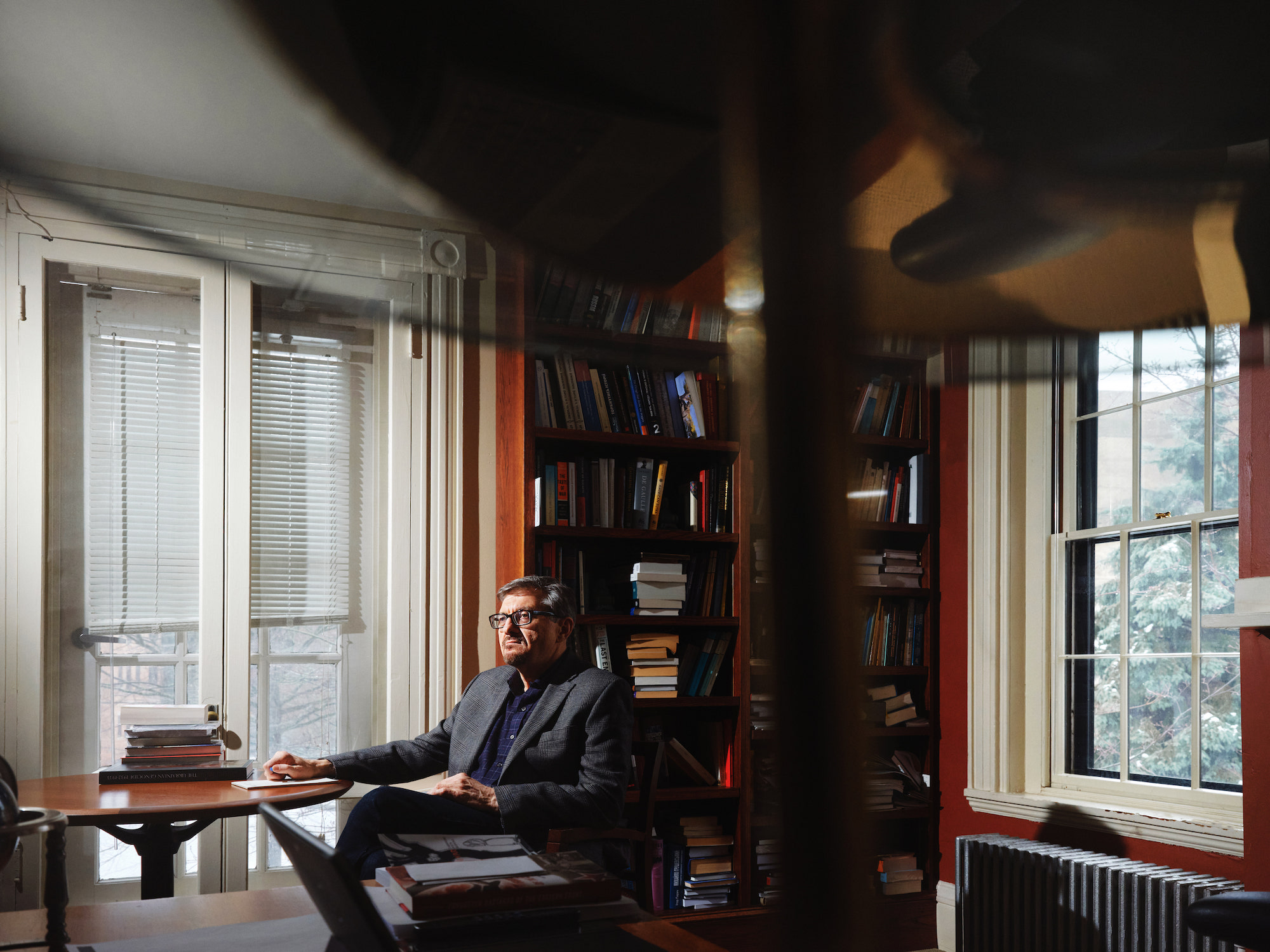
“Many members of the older generation were offended,” Wenger says. “They defended their theses when they were 55 or 60, in the sunset of their careers, and there was someone who defended their habilitation thesis at 30. One of the reasons was not just Serhii’s organizational skills but also linguistic. He found foreign-language sources that had not been studied by our historiographical community.”
Moreover, Plokhii’s former colleagues talk about his incredible flair for various research areas. When he worked in the department, he learned that the Dnipropetrovsk Regional Archive kept records on the history of the Mennonite and German colonists and suggested researching this subject.
“The choice of the subject proved to be very apt. In the United States, Plokhii found a link to the sources preserved in our archives, and later a whole generation, including his graduate students, researched it.”
Friends and students of Serhii Plokhii remember that he brought back from his trips abroad not only a lot of fresh ideas but also a VCR and new films. Albert Wenger says that people in Dnipro remember the Plokhii as a very hospitable family.
“His house was always full of people,” he says. “His fellow students said that everyone gathered at the Plokhii’s house. His graduate students remember that his wife always greeted them very warmly and invited them to lunch or dinner. Their relations were really warm and friendly.”
History and professional historians have certain obligations
Dnipropetrovsk University named after the Tercentenary of Ukraine’s Reunification with Russia was directly under the Ministry of Higher Education of the USSR. This provided Dnipropetrovsk scholars with many privileges: internship quotas, access to archives and primary sources, and better financial support.
“Direct subordination to Moscow eliminated many restrictions that other Ukrainian universities faced. For example, those in Kyiv or Lviv. Initially, it was the funding of internships abroad. In the 1970-1980s, it was almost impossible for historians to do a fellowship in Germany, Poland, or any other country. But here it was possible. Secondly, it sounds paradoxical, but subordination to Moscow allowed us to work on issues concerning Ukraine,” says historian Albert Wenger.
Professor Mykola Kovalsky managed to obtain the necessary permits and paper for printing research materials. In Dnipropetrovsk, he founded a school of Ukrainian researchers who studied the period of early modernism or, as it was called then, feudalism or the Late Middle Ages in Ukraine. The professor invited scholars who were interested in research. Among them, there were no protégés appointed after the call of the superiors. Serhii Plokhii says about this period:
“The niche of early modern history existed like a challenge to official history. The 1970s was the time of purging ‘Cossackophiles’ or scholars who researched feudal history. It was not an openly oppositional subject or platform, but in some ways it was very dangerous because you could be accused of Ukrainian nationalism and other things. But it was also a space of freedom. In our publications, we were supposed to refer to all kinds of official papers—published by the Communist Party and others—but the research was not politicized anyway, and that was the most important thing.”
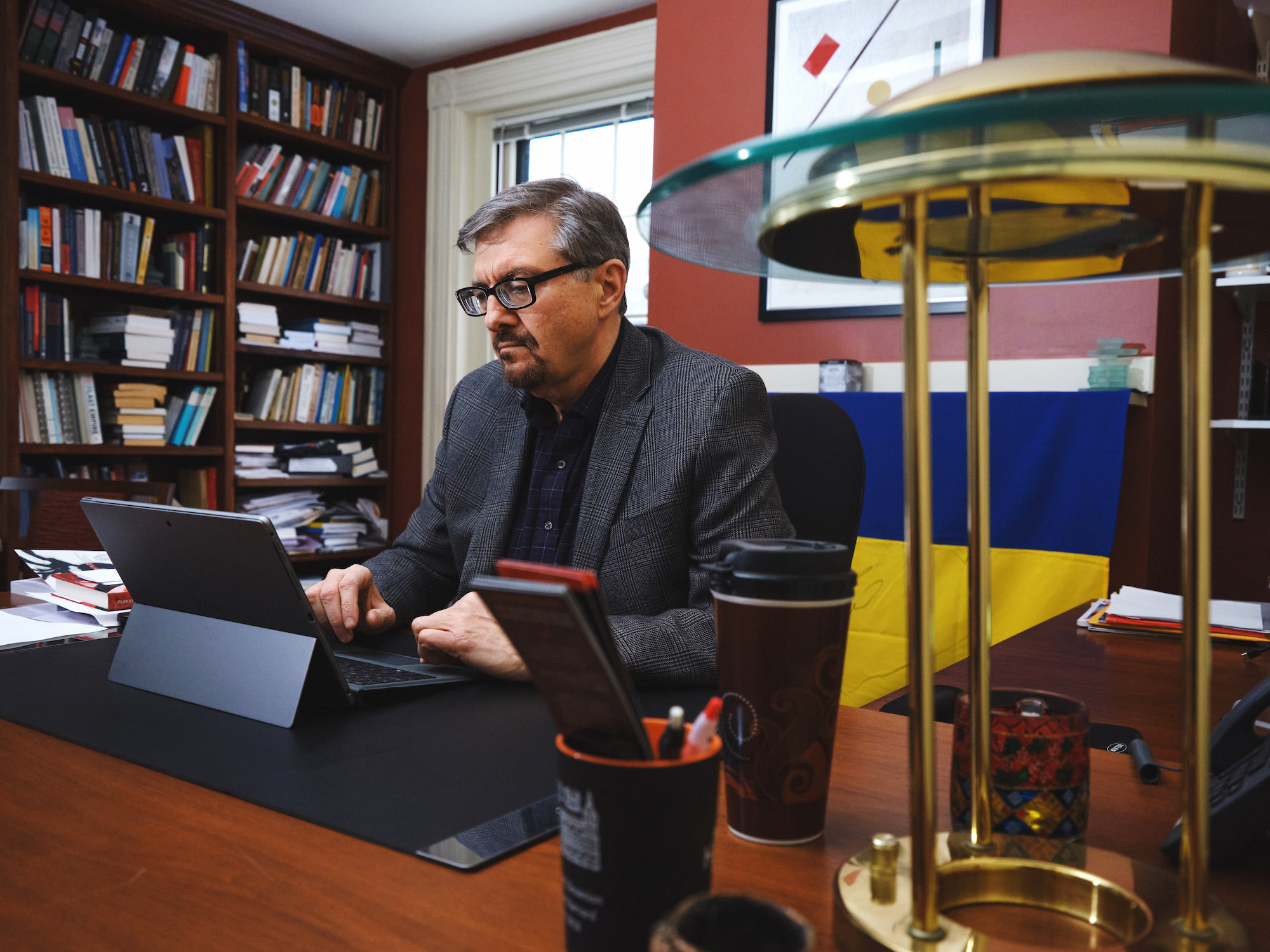
Research in the 20th century inevitably had a political component. Meanwhile, the niche of early modern history proved largely depoliticized. In the late 1980s – early 1990s, Serhii Plokhii, and his colleagues, including his research advisor Yuriy Mytsyk, published two books on Cossack history: How Cossacks Fought: Historical Accounts about Zaporizhzhia Cossacks and Yet We Shall Never Forget the Cossack Fame of Yore. Then, Serhii Plohii says, he realized that it was necessary to talk about important things in a popular way, not just scientifically.
“I believe that history and professional historians have certain obligations to the society in which they live. If they do not understand them, the whole incredibly important field is left open to impostors. Nature does not tolerate a void, and that void will be filled. But this is also my personal choice. It’s also an essential part of my profession, of how I see myself as a historian.”
Taking off the hat of a master… and putting on a cap of an apprentice
The 1990s were the years of great hope and change. Together with his colleagues and Frank Sysyn, Serhii Plokhii organized a conference in Dnipropetrovsk dedicated to the Khmelnytsky Uprising.
“I don’t remember who wrote to whom first,” Sysyn says. “In 1990, we resumed contact and opened Dnipropetrovsk to foreigners. We organized a conference. I got the opportunity to learn more about the community in Dnipropetrovsk and saw that Professors Mykola Kovalsky and Yuriy Mytsyk had indeed built a really strong school of historians there. This became the basis for Professor Plokhii.”
At that time, Frank Sysyn was appointed the first director of the Petro Jacyk Center for Ukrainian Historical Research at the Canadian Institute of Ukrainian Studies. He invited Serhii Plokhii to teach history at the University of Alberta.
“Professor Plokhii was invited first,” says Sysyn. “In fact, there was a coup [2] in the Soviet Union. He was flying from Moscow that day and had the latest information. The important thing was that we were establishing a new institute. We had been thinking about how we could develop the humanities in Ukraine and support new projects. We had new contacts with Ukraine but no access to primary sources or relationships with scholars, and there he was—someone who knew many historians in Ukraine and understood the situation. Plokhii knew many historiographical things that we did not know about. He knew many people we did not know and better understood the changes in Ukraine and whether they were real or superficial.”
At 35, Serkhii Plokhii, department chair and dean for international student liaison, thought he would go to Canada for just one semester. But he stayed for fifteen years at the newly established Petro Jacyk Center. This became his chance to reinvent himself, he says.
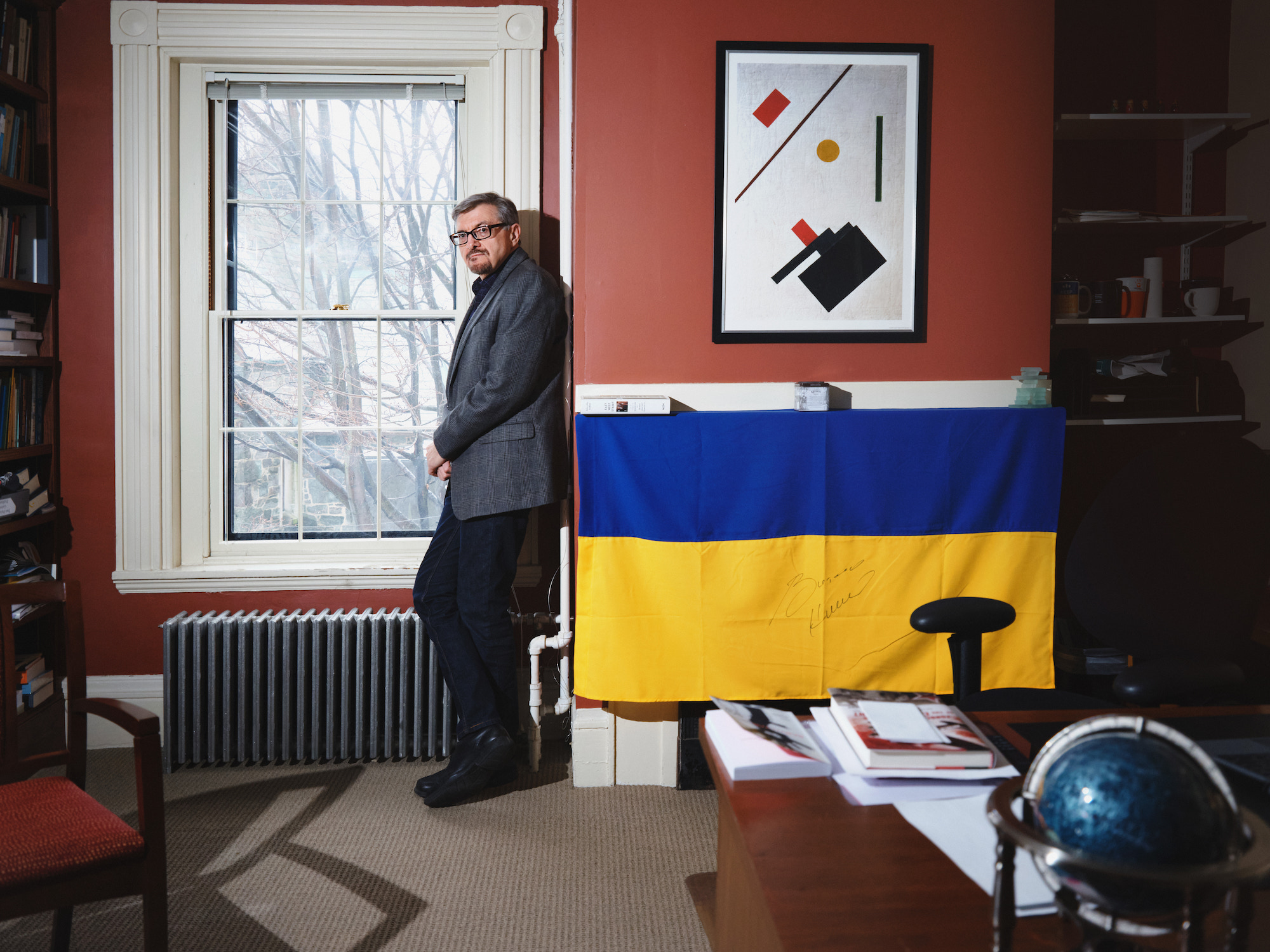
“On the one hand, it was a kind of dream, if only half-articulated: to live side by side and communicate with a completely different formation of professional historians. Just the idea of a research seminar and discussions. That was a whole new level. I wanted to be part of that process. On the other hand, it was the early 1990s. It was very difficult to make ends meet, whereas I was offered that opportunity to combine my professional passion with the possibility of supporting my family. But you paid a high price for it. Your social status, your self-perception, your relationships. You took off the hat of a master for which you’d worked so hard and put on the cap of an apprentice.”
In the spring of 1992, under pressure of circumstances, the historian left his program and department, but continued to work part-time at the Archaeographic Institute for four more years. The Plokhii family had long thought of returning to Ukraine and considered Canada their temporary host country, not home. They did not even buy a car.
“It was our family decision,” Serhii says. “We did not go there to stay, but just for a short time. It was an opportunity for our children to spend six months in Canada and learn the language. In Edmonton, public transportation was not really developed yet, and we lived without a car for two years, if I remember correctly. Partly because we did not plan to stay. The city was built after World War II and was designed for cars. Sometimes there were no sidewalks, and you just had to walk on the road.”
Serhii Plokhii believes that the continuity of his research topic, the continuity of contacts and research were the only things that made his emigration a little easier. So was the Ukrainian cuisine, which reminded him of home.
“The biggest continuity in emigration is traditional Ukrainian cuisine,” he says.
“Old recipes, new recipes that my wife invented, and many others brought from Ukraine. And then there is the exchange of recipes—with my mother at that time, with our relatives. This is the clearest, the brightest feature. The kitchen is a sign of a certain cultural epoch, a straightforward sign that is preserved.”
Serhii Plokhii worked mainly as a researcher at the Canadian Institute of Ukrainian Studies. For more than a decade he was deputy director of the Petro Jacyk Center. In particular, he researched the legacy of Mykhailo Hrushevskyi and co-edited the English translation of his seminal work History of Ukraine-Rus’. Plokhii recalls:
“The work on Hrushevskyi takes you into the world of history, which is not only the world of primary sources and facts, but also the world of interpretations. It was my greatest discovery, my reinvention of the discipline of history itself after living in a kind of Soviet underground. It was a transformative experience.”
In due course, the first of the ten volumes of the History of Ukraine-Rus’ were published in English. It was the first major project of the Institute. Frank Sysyn talks about the role and contribution of Serhii Plokhii to it:
“Through his contribution, we have achieved many great things. He knew this environment well and wrote strong, fascinating introductions. Later, he wrote a brilliant monograph on Hrushevskyi.”
In 2007, Plokhii received an offer from Harvard. He was invited to the place where he had actually started. Frank Sysyn admits that this was a great loss for the Petro Jacyk Center for Ukrainian Historical Research. “But,” he adds, “we understood what this meant for Ukrainian studies and the future of the Institute. The fact that he would be a professor at Harvard.”
Ukraine in the world and the world in Ukraine
In 2007, Serhii Plokhii joined the Ukrainian Research Institute at Harvard University as a professor and became its chair in 2013. An important part of the Institute’s activities is to support students and faculty and help them organize their research.
“Structurally, the institute is one of the many international centers at Harvard. We organize seminars, events, lectures, and discussions and support students who are researching or interested in Ukraine. We provide travel grants to attend conferences in Ukraine. Another important part is the visiting program—guests of the Institute and visiting scholars who come to work here.”
The Institute not only supports research but also carries it out, which is important for Ukrainian studies in the West and the presentation of Ukraine and Ukrainian research. It follows the model of a European center proposed by its founding fathers, Omeljan Pritsak and Ihor Shevchenko.
“We have a small publishing house and publish our own journal, Harvard Ukrainian Studies (HUS)—no other center has anything like it. We also run a summer school and continue the original research project launched by the founding fathers. It is the translation and publication of the Ukrainian literary corpus from before the 18th century, ‘the pre-secular literature.’ We have also launched a digital humanities project, the first in the field of Ukrainian studies. We run it jointly with many institutions and individual researchers in Ukraine. So the institute is committed to four research areas, which is even more than Harvard could expect from us.”
The Ukrainian Institute actually works in two shifts. How to keep up with everything? Serhii Plokhii says that the most important thing is to find the right balance. He has published more than ten books of his own so far. Some of them—The Gates of Europe and Chernobyl, which deal with Ukrainian history, and Nuclear Folly: A History of the Cuban Missile Crisis—are bestsellers. However, the historian himself considers The Cossack Myth his best book and The Forgotten Bastards of the Eastern Front his most underrated.
“Books are my way of informing and educating,” he says.
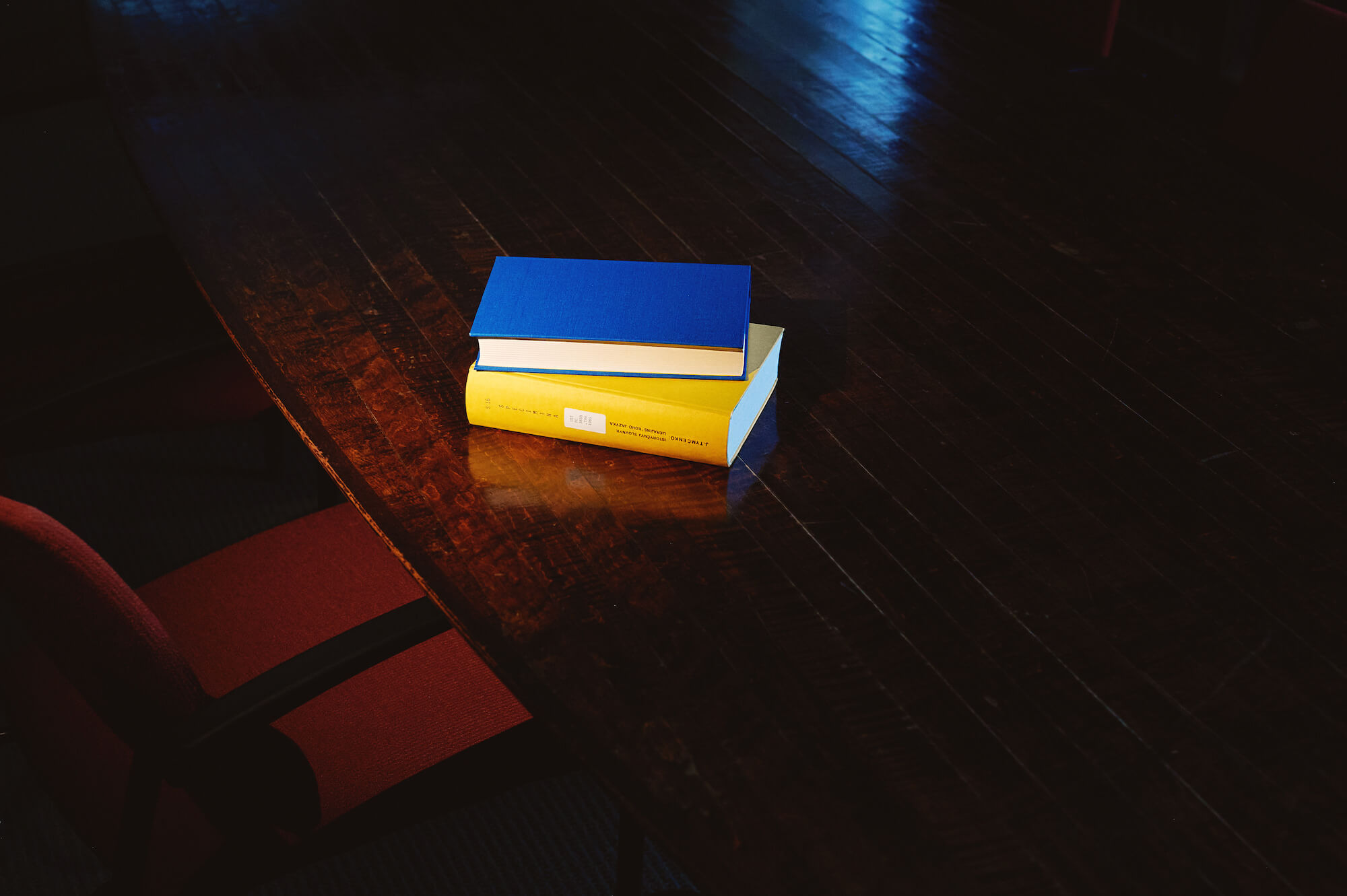
“I can easily say what I’ll be doing in the next two or three years, but it’s very hard to say where I’ll be in ten years. But when I look back at the past decade, I see that there is one big theme that interests me in every research and any historical period—Ukraine in the world and the world in Ukraine.”
Plokhii’s new book, The Russo-Ukrainian War: The Return of History, will be published in the United States in May. The researcher has been writing about the history of Russo-Ukrainian relations for three decades. But even for him, the attack of Putin’s Russia on Ukraine came as a complete surprise. He says that a year ago it was hard to predict the long-term future. Now it is much easier. The changes that have taken place in Ukrainian society over the past eight years have reshaped it.
“Ukraine has been going through the most important tests for any organism,” he says. “It has shown that this organism is resilient, can withstand external blows and internal diseases, and has a prospect of living. This is a very young society that has lived in its own state for only thirty years. By historical standards, this is a childhood. These absolutely necessary inoculations, inoculations that we thought we could avoid, the inoculations that nations receive in wars of independence—we receive them with a very painful and tragic result, but they are for the long term: They are vaccinations for the future that will guarantee our intellectual, emotional, and economic health.”
Serhii Plokhii is moderately optimistic about the future of Ukraine. He believes that Ukraine will remain a democracy and will join the European economic, security, and political structures. It is only a matter of time.
“The victory of Ukraine,” he says, “means not only the preservation of Ukraine but also the victory of the principles of state sovereignty, independence, and the ability to make its own foreign policy decisions. It is the victory of democratic principles. This victory is tremendously important because we live in a new situation in the world. This war is the biggest and the most brutal in Europe since World War II. It ended the period of long peace in Europe and partly in the world after the end of the Cold War and the fall of the Berlin Wall. What will be decided on the battlefield in Ukraine will determine not just a few pages, but a whole chapter of world history that is just beginning.”
According to Serhii Plokhii, this is a turning point in world history. The question is not only what Ukraine will look like but what the whole world will look like in time.
***
Serhii Plokhii is experiencing this war from afar. But he says that this experience of returning to the events of the 20th century influences him as a historian—just like his biography.
35 years in Ukraine, 15 years in Canada, 16 years in the United States. In Ukraine, Serhii Plokhii had two children, and in the USA, two grandchildren. He is now an American citizen, but I still ask him where his home is. He finds it hard to answer this question.
“At some point, it seemed that I felt like home only on a plane somewhere over the Atlantic. When you started to move away from where you used to live, you were not fully integrated into the new place, and there was that situation when you had more than one home.”
Three decades have passed since Serhii Plokhii left Ukraine. He believes that despite different circumstances, doubts, rises, and falls, one should always know the answer to the key question: What is it all for anyway? “I wanted to become a good historian”—this is the answer Serhii Plohii arrived at when he asked himself why he took the risk and started everything from scratch in the 1990s.
§§§
[1] Robert Conquest and James Mace’s project. The British historian collaborated with his American colleague on The Harvest of Sorrow, a book that remains the most important English-language study of the Ukrainian tragedy of 1932-33. In December 1985, a U.S. Commission on the Famine in Ukraine was established at the Congress to gather information on the Holodomor and analyze its causes and consequences. James Mace was its executive director.
[2] The Soviet coup d’état attempt in Moscow, also known as the August Coup.
§§§
Translated by Hanna Leliv.
